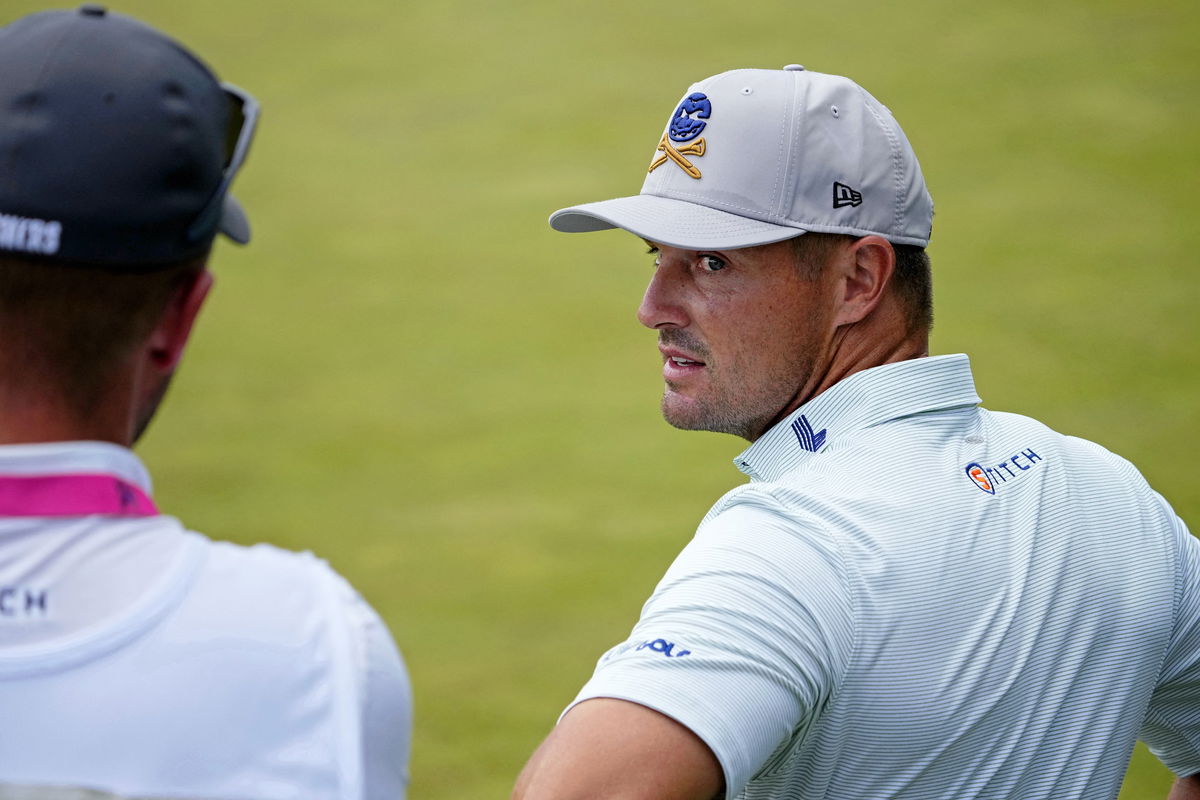
USA Today via Reuters
May 18, 2024; Louisville, Kentucky, USA; Bryson DeChambeau talks with his caddie on the fourth green during the third round of the PGA Championship golf tournament at Valhalla Golf Club. Mandatory Credit: Adam Cairns-USA TODAY Sports

USA Today via Reuters
May 18, 2024; Louisville, Kentucky, USA; Bryson DeChambeau talks with his caddie on the fourth green during the third round of the PGA Championship golf tournament at Valhalla Golf Club. Mandatory Credit: Adam Cairns-USA TODAY Sports
USGA’s Rule 6-7: “The player must play “without undue delay and in accordance with pace-of-play guidelines.” A group is out of position when it completes play on a hole later than the maximum allowable time under those guidelines. A player is permitted a maximum of 40 seconds to play a stroke, with the first player in the grouping allowed an extra 10 seconds. A player is given a warning for their first “bad time.”
Watch What’s Trending Now!
The howling winds, the course difficulty, and the resulting slow pace of the game has become a continued issue at Royal Portrush. Seemingly, it didn’t stop on Saturday either. Marc Leishman even expressed his exasperation because he, “Felt like we were on the golf course for about 12 hours.” And it isn’t just him complaining about it. However, Bryson DeChambeau had a different reason to add for what happened to him.
The LIV golfer entered the third round after his 7-birdie comeback on Friday. While he continued the momentum, putting five birdies, the day ended with frustration for him. DeChambeau was paired with England’s Nathan Kimsey for the weekend. While the two “tried” to play as fast as they could, they ultimately fell behind in pace. As a result, a rules official timed DeChambeau’s approach on the 17th hole. But according to him, it wasn’t his fault.
In his post-round presser, a reporter asked DeChambeau to fill them in on the details of him being put on the clock. He responded while pointing fingers, “Yeah, he timed me on 17 after I striped the drive down there. 16, difficult hole, got up-and-down in a difficult spot. Understand we were struggling with pace the whole day. I was moving my butt as fast as I could. Greens were really tricky. I was trying to read them right.
Yeah, we just kept losing time. Unfortunately, on the 16-17 exchange, you’ve got a downhill drivable hole you can play pretty quick if you get in the right spot. They did that, and we just lost more time to the group in front of us, and they put us on the clock, which is unfortunate.”
Well, seems like he believes that the group in front of him, Thomas Detry and J.S. Olesen, were playing slow which directly affected his playing time. However, he also had a solution. “It’s very simple. It’s not difficult at all. You eventually time everybody for their whole entire round. If somebody is playing slower, the guy can go up to him and say, hey, man, you’re over par with your time.
“Well, I think it would be more fair towards everybody. If somebody is playing slower, the guy can go up to him and say, ‘Hey, man, you’re over par with your time.’ All you do is you just time them for every single shot. He gets there and puts the bag down, and how long it takes him to hit that shot and how long it takes him to walk to the green. It’s not rocket science.
“You time how long someone takes individually, and then you separate that from the other person playing. You start/stop on him the whole entire thing. It’s one way. I’m not saying it’s the answer. I’m definitely not somebody that has the most experience or knowledge on it.”
Well, DeChambeau’s optimism about a better system is infectious. However, as the PCA member Justin Thomas stated before, the conversations usually end with confusion instead of a solution. Meanwhile, Bryson DeChambeau isn’t the only major winner warned for pace of play problems.
The 2025 U.S. Open Champ faced a ‘bad time’ at Royal Portrush
On Thursday, J.J. Spaun, the freshly crowned US Open winner, received a “bad time” on the 18th hole at Royal Portrush, with his group including Jon Rahm and Xander Schauffele on the clock. Spaun’s group was moving at a glacial pace, taking over five-and-a-half hours to reach the final fairway. As John Wood, the on-course reporter, noted, “I’ve been with them for five holes, and I have not seen a group in front of them.”
Spaun’s mistake? He went over his allotted 50-second time limit on his second shot on the par-4 17th. According to Charlie Maran, the R&A rules official, “J.J. would have had 50 seconds… to play [his approach] into the [17th] green because he was the first person to play… Unfortunately J.J. ran over the 50 seconds.”
This warning is just the beginning – if Spaun receives another bad time, he’ll face a one-shot penalty. And if he’s caught out again, the penalties will keep piling up. Even players like Justin Thomas are not safe from the slow-play plague. With players like DeChambeau already getting clocked and speaking out about the issue, it seems the R&A is taking pace of play seriously. Will stricter enforcement and penalties finally get the players moving at a brisker pace? We would love to hear your thoughts on the matter.


